There's one group of US companies still scheduled to report Q2 earnings as the season winds down: major retailers.
Overall, the sector has been among the big winners as consumers accelerated their shift to online shopping in the wake of the coronavirus pandemic and subsequent government-mandated lockdown measures.
Not surprisingly, retail-related ETFs are trading near their best levels on record, with the SPDR® S&P Retail ETF (NYSE:XRT) up around 92% since its March low, compared to the S&P 500’s roughly 52% gain over the same period.
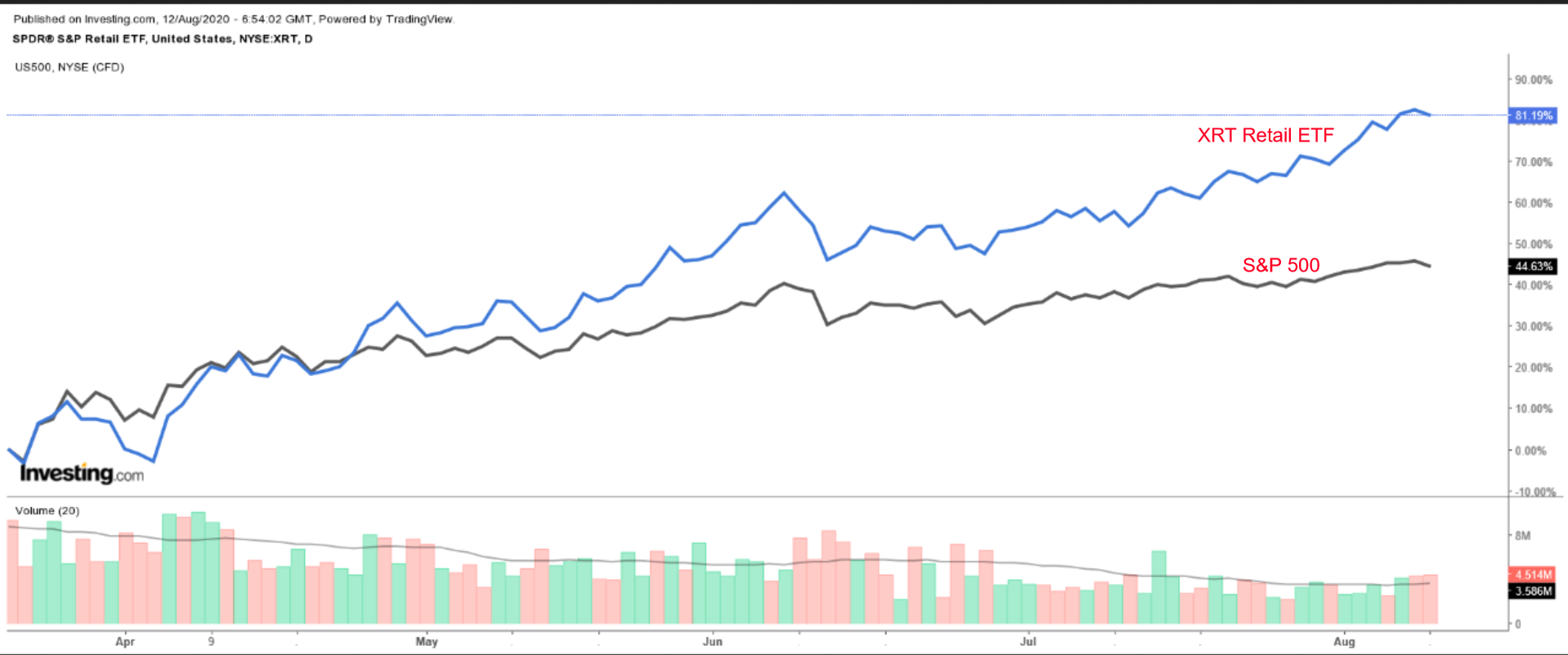
Ahead of their upcoming quarterly results, we are highlighting three of the best-performing names in the sector which have proven that they can successfully compete with Amazon (NASDAQ:AMZN) online. We're also including one vendor to avoid entirely as shoppers steer clear of crowded malls.
1. Walmart: Reports August 18 Before Markets Open
- EPS Growth Estimate: -2.3% YoY
- Revenue Growth Estimate: +3.5% YoY
Walmart (NYSE:WMT) has been a powerful performer in the retail space in recent months, with shares up around 28% from their March lows, thanks in large part to rapid growth in e-commerce and online sales amid the ongoing coronavirus pandemic.
The Bentonville, Arkansas-based company’s stock—which touched an all-time high of $134.12 on July 15—ended at $130.20 on Tuesday, giving it a valuation of $368.7 billion.
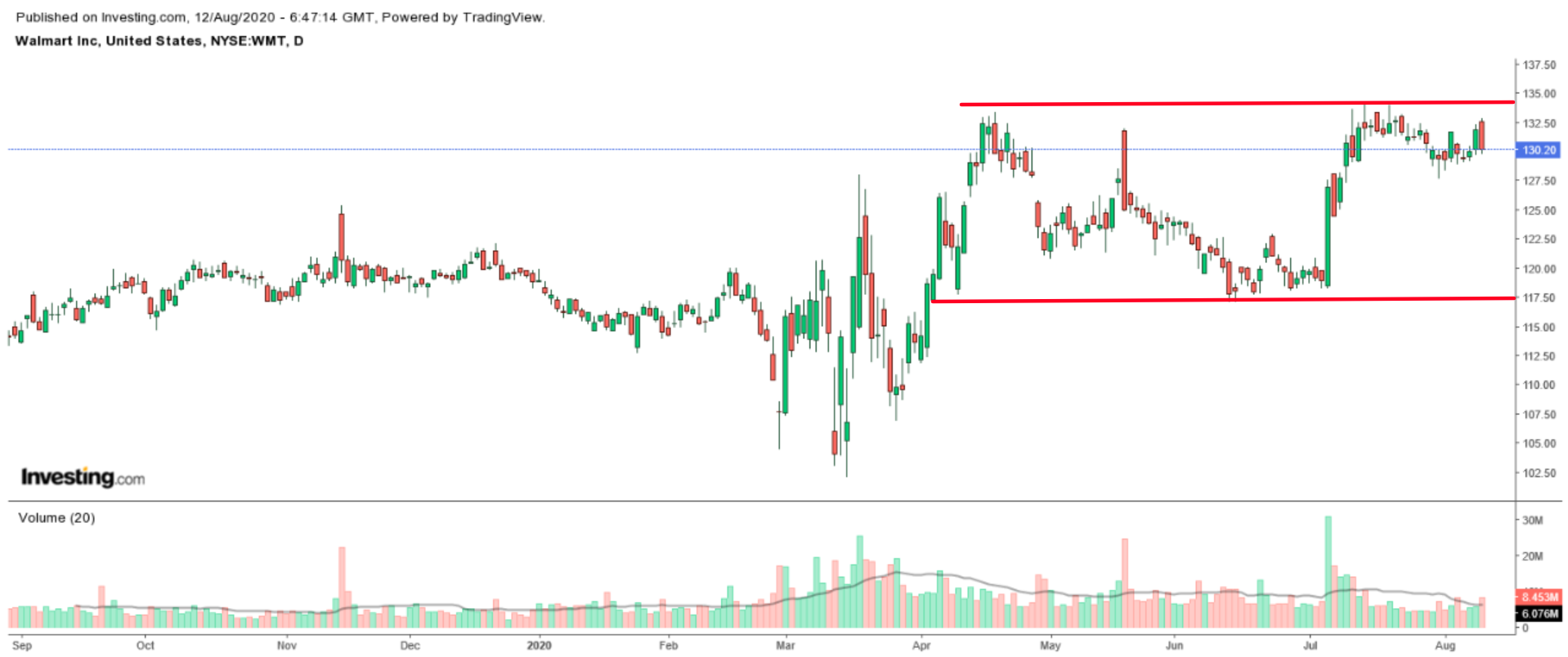
The world’s largest brick-and-mortar retailer, whose earnings and revenue easily beat estimates in the first quarter, is projected to report earnings per share of $1.24, compared to EPS of $1.27 in the same period a year earlier. Revenue is forecast to rise roughly 3.5% year-over-year to $135.03 billion, benefitting from increased online sales.
As such, investors will pay close attention to growth in Walmart’s e-commerce figures, which soared by a record 74% in the previous quarter. The corporation announced on its Q1 earnings report that grocery pickup and delivery for food and other consumables reached record sales volumes.
Comparable sales, which jumped 10% in Q1, will also be of importance. Walmart has posted a more than a five-year streak of US growth, unmatched by any other retail chain.
2. Best Buy: Reports August 25 Before Markets Open
- EPS Growth Estimate: -7.4% YoY
- Revenue Growth Estimate: +0.4% YoY
Similar to Walmart, shares of Best Buy (NYSE:BBY) have benefitted this year from robust e-commerce revenue growth. Over the past 12 months, the mammoth US consumer electronics retailer has seen its stock shoot up 64% as it continues to be one of only a handful of electronics retailers still thriving amid growing competition from Amazon.
Shares rose to a record high of $105.57 yesterday, before settling at $104.12, giving the Richfield, Minnesota-based retailer a market cap of $26.9 billion.
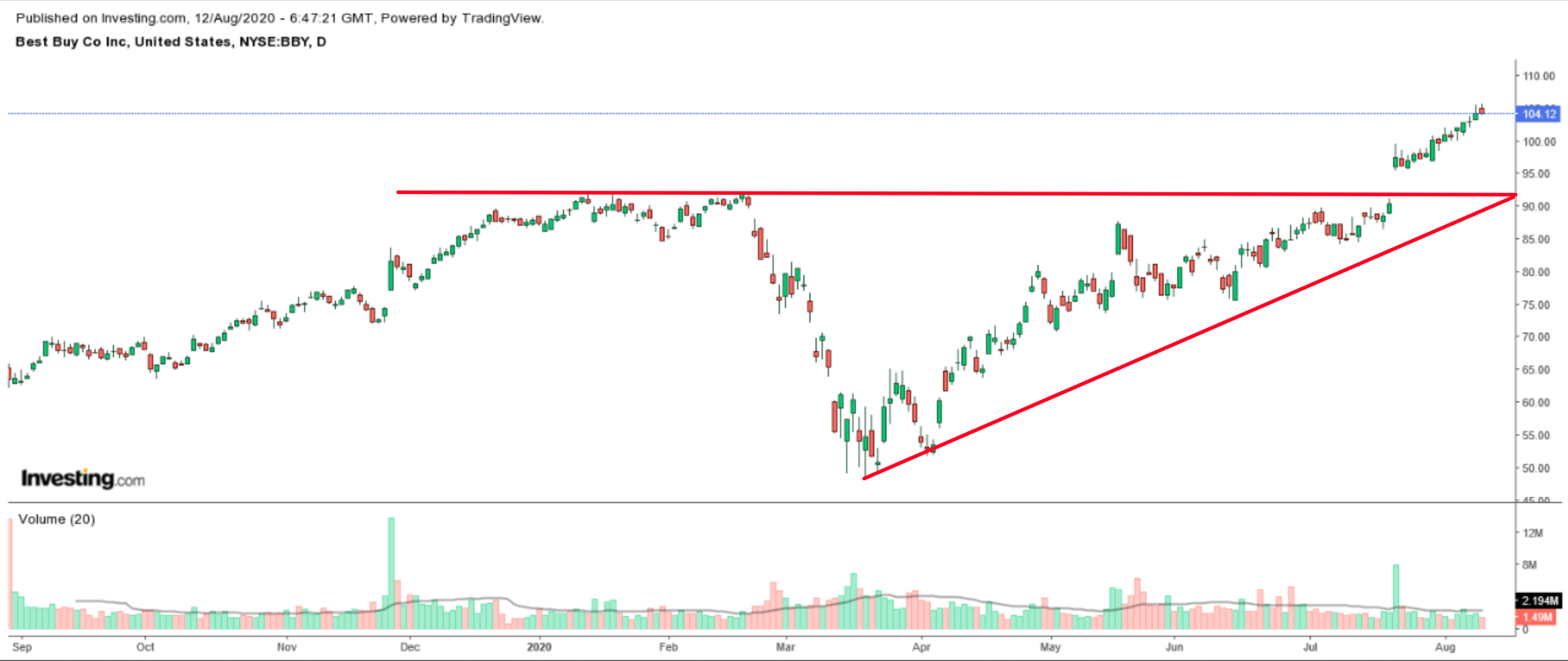
Best Buy is scheduled to report second-quarter results ahead of the opening bell on Tuesday, August 25. Consensus estimates call for the tech gadget retailer to post earnings of $1.00 per share, down slightly from EPS of $1.08 in the year-ago period. Revenue is expected to reach $9.58 billion, up from sales of $9.54 billion in the same period a year earlier.
In addition, investors will be keen to see if ongoing investments in Best Buy’s online business are continuing to pay off after domestic online revenue surged more than 155% in Q1 to $3.34 billion.
In a promising sign, the company announced last month that its online sales have more than tripled during the current quarter through July 18, rising 255% due to sky-rocketing online demand for computers, tablets and other work-from-home equipment.
3. Dollar General: Reports August 27 Before Markets Open
- EPS Growth Estimate: +36.7% YoY
- Revenue Growth Estimate: +17.9% YoY
Dollar General (NYSE:DG) is the largest discount retailer in the US, with more than 15,000 stores in 44 states. The Goodlettsville, Tennessee-based company, which sells groceries, household supplies and personal care products at low prices, has seen its shares climb around 53% since hitting a recent low in March.
The stock, which reached an all-time high of $197.23 on August 5, ended at $191.09 on Tuesday, giving the discount retail chain a market cap of around $48.1 billion.
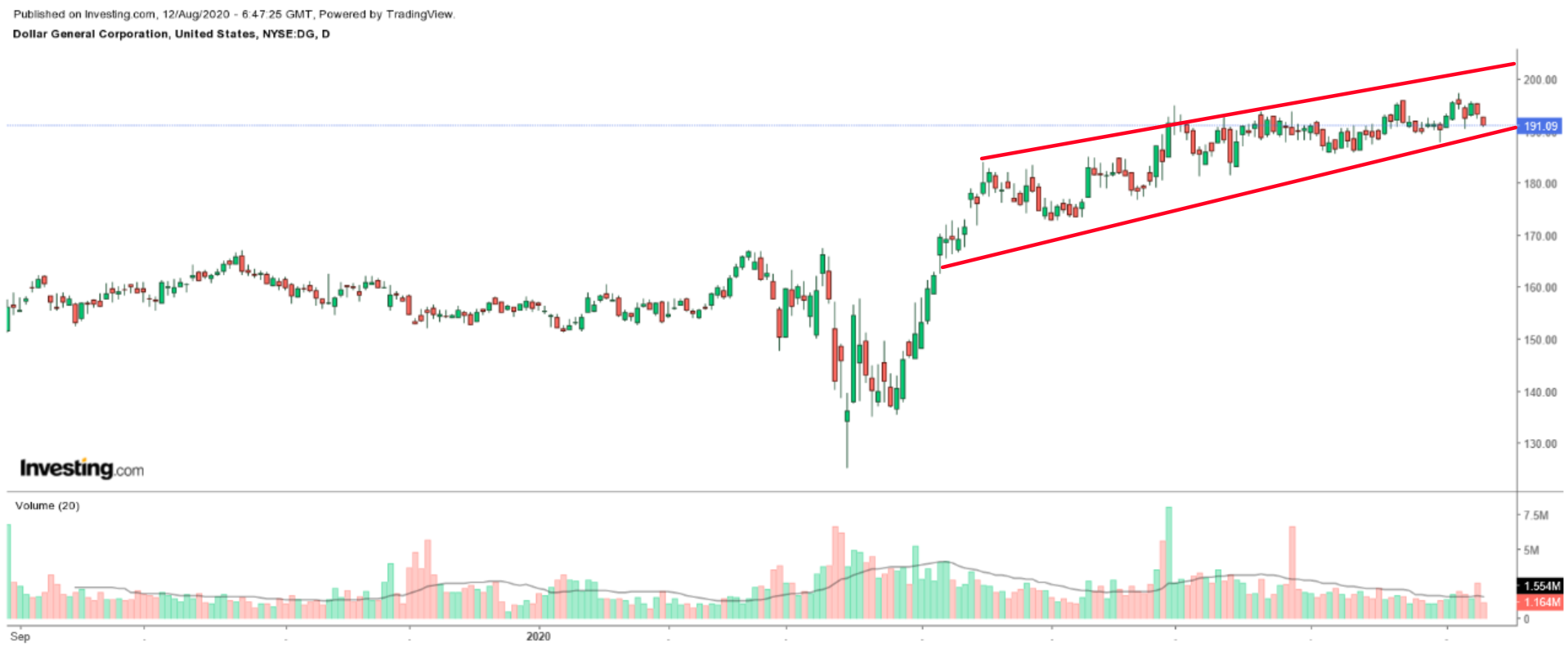
Dollar General reported blowout first-quarter results at the end of May. Consensus calls for earnings per share of $2.38 for the second quarter, which would mark a year-on-year increase of roughly 37%. Revenue is forecast to jump almost 18% from the same period a year earlier to $8.23 billion, reflecting booming demand from customers stocking up on groceries and household essentials.
In addition, investors will focus on Dollar General’s update regarding its same-store sales, a key metric in retail, measuring store-by-store sales performance. Sales jumped 21.7% in the last quarter, the most significant rise in at least 14 years.
Stock To Avoid
Kohl’s: Reports August 18 Before Markets Open
- EPS Growth Estimate: -163.2% YoY
- Revenue Growth Estimate: -27.8% YoY
In a sharp contrast to the strong annual performances seen in the other three names mentioned, Kohl's (NYSE:KSS) stock has been stuck in a downward trend for most of 2020 as it struggles to find new ways to win over shoppers.
The Menomonee Falls, Wisconsin-based department store retailer, which owns over 1,100 stores across the country, has lagged its competitors in ramping up initiatives such as online sales and in-store pickup options.
Shares, which are down more than 54% year-to-date, closed at $23.24 last night, giving it a market cap of roughly $3.6 billion.
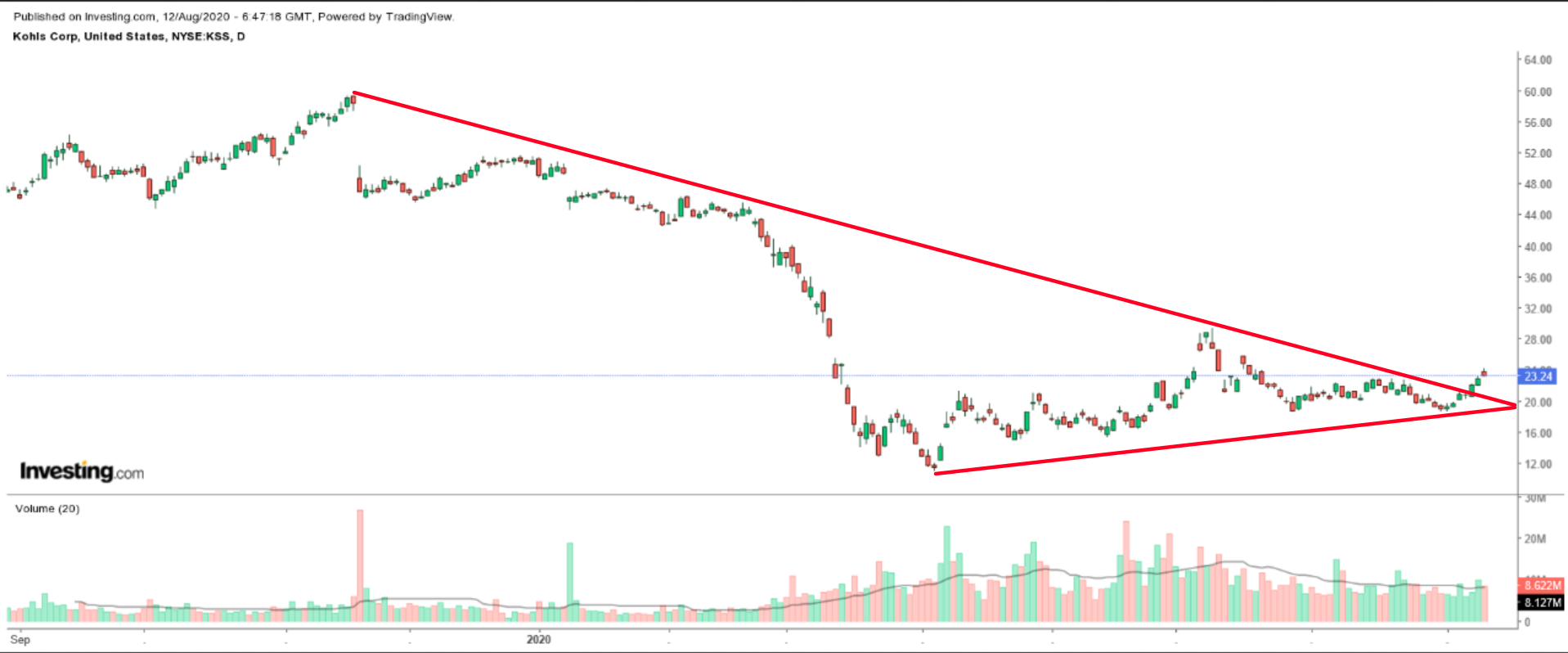
Kohl’s reported a bigger-than-expected loss for its last quarter. Consensus calls for a loss of $0.98 per share for the second quarter, compared to earnings per share of $1.55 in the year-ago period, reflecting the struggling department store retailer’s rising costs in its efforts to combat the negative impact of the coronavirus outbreak. Revenue is forecast to decline nearly 28% from the same period a year earlier to $3.01 billion.
Beyond the top- and bottom-line figures, investors will keep an eye on Kohl’s update regarding its online sales figure. Kohl’s announced on its Q1 earnings report that online sales rose 24% overall as the chain limited operations to its app and website amid government-mandated lockdowns.
